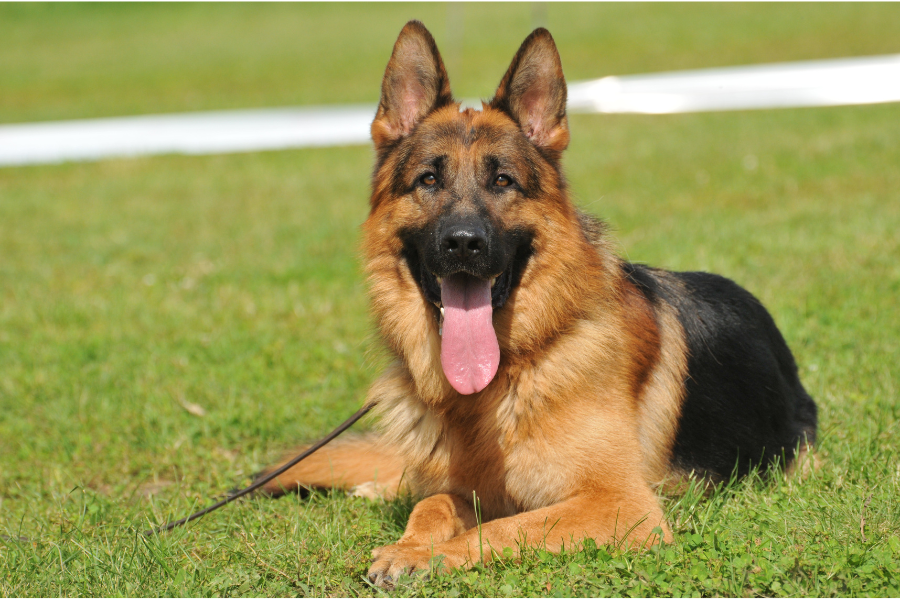
German Shepherds as Service Dogs: Are They the Right Fit for You?
- Published on:
- By: ASP Team
Service dogs are invaluable companions, providing essential support to individuals with physical, psychiatric, and sensory disabilities.
While various breeds excel in this role, German Shepherds stand out as a top choice due to their exceptional trainability, unwavering confidence, and natural protective instincts.
This article delves into why choosing a German Shepherd as a service dog could be ideal for you, as well the roles they excel in, effective training methods, and how American Service Pets can guide you through training and documentation.
Programs like iTrain Academy are designed to help you get started on this rewarding journey.
Why Choose a German Shepherd as a Service Dog?
1. Exceptional Intelligence
German Shepherds consistently rank among the most intelligent dog breeds. They can learn complex tasks, adapt to new environments quickly, and retain training well. This makes them ideal candidates for service work that requires focus and precision.
2. High Trainability
These dogs thrive on structure and respond well to obedience training. Whether guiding a person through crowds or retrieving medication, German Shepherds follow commands with consistency and reliability.
3. Strong Work Ethic
Originally bred for herding and police work, German Shepherds are naturally inclined toward purposeful activity. They’re not content being idle—they want a job, and they excel when given one.
4. Loyalty and Protective Nature
German Shepherds form strong bonds with their handlers. Their alertness and devotion make them well-suited for tasks involving safety, personal security, and psychiatric support.
Get Your ESA Today
What Types of Service Work is a German Shepherd as a Service Dog Best At?
German Shepherds are highly versatile service animals, capable of assisting with a wide range of physical and psychiatric disabilities. Their intelligence, loyalty, and trainability make them suitable for roles such as mobility assistance, where they help individuals with balance issues or limited movement.
They are also trained for guide work to aid the visually impaired, though this role is more commonly associated with Labradors. Additionally, they excel in medical alert tasks, notifying handlers of seizures, blood sugar drops, or other medical episodes.
For individuals with PTSD or anxiety, German Shepherds provide critical support by interrupting panic attacks, offering grounding, or creating personal space.
They can also serve as hearing assistance dogs, alerting handlers to important sounds like alarms, doorbells, or their names being called. Their adaptability and dedication make them invaluable partners for individuals with diverse needs.
Are There Any Challenges With This Breed?
While German Shepherds offer many benefits, they are not a perfect match for every handler.
Considerations to think about with a German Shepherd as a service dog:
- Energy Level: This breed requires consistent physical and mental exercise
- Size: At 60-90 lbs, German Shepherds may not suit handlers needing a smaller dog
- Protective Instincts: Without proper socialization, they may become overly wary of strangers
- Shedding: Their double coat sheds year-round and needs regular grooming
These challenges can be overcome with early socialization, focused training, and structured routines, especially when guided by a professional program.
Training a German Shepherd as a Service Dog
Here are some steps to follow when training a German Shepherd as a service dog:
Step 1: Start With Obedience
Before beginning service tasks, it’s essential for your German Shepherd to develop a solid foundation in basic obedience.
Commands such as sit, stay, come, heel, leave it, down, and focus are crucial for ensuring reliability and control in various situations.
Additionally, your dog must become comfortable with leash walking in busy environments. These foundational skills create the discipline and focus necessary for advanced service training and effective task performance..
Step 2: Introduce Task-Specific Training
Once obedience is solid, begin teaching tasks based on the handler’s disability:
- Deep pressure therapy
- Guiding to exits during episodes
- Retrieving objects or medication
- Blocking (creating personal space in crowds)
Tip: Many handlers train their own German Shepherds using online programs like iTrain Academy, which walks you through obedience, task training, and public behavior in short, digestible lessons.
iTrain Academy: Helping You Train From Home
At American Service Pets, we understand that in-person dog training programs can be costly or inaccessible for many families. That’s why we created iTrain Academy, a digital platform designed specifically for service dog preparation.
iTrain Covers:
- Basic to advanced obedience
- Task training tailored for psychiatric or physical disabilities
- Public access readiness
- Daily routines to build confidence and consistency
Training is broken into short, practical modules that take just 15 minutes a day—perfect for busy handlers or those starting from scratch.
Do I Need a Doctor's Letter?
While the ADA does not require official documentation for service dogs, many handlers choose to obtain a Psychiatric Service Animal (PSA) letter or a Service Dog Recommendation Letter from a licensed professional.
This documentation can be especially useful in situations involving housing or travel, as it clearly explains the service dog’s role and the handler’s need for assistance.
With American Service Pets, the process is simple. Complete a quick intake form, connect with a licensed therapist in your state, and, if eligible, receive a service dog recommendation letter.
This letter verifies your disability and highlights the crucial role of a trained service animal, providing strong support when navigating conversations with landlords or airlines.
Are German Shepherds Good for First-Time Handlers?
Yes, but with guidance.
German Shepherds are highly intelligent and responsive, but they require consistency. If you’re a first-time dog handler, structured support (like iTrain Academy) can make all the difference.
You’ll need to:
- Socialize early and frequently
- Train in a variety of environments
- Maintain physical and mental stimulation
With the right approach, even first-time owners can succeed.
FAQs
Are German Shepherds too protective to be good service dogs?
Not if they’re properly socialized. German Shepherds have strong protective instincts, but with early exposure to different people, environments, and situations, they can learn to stay calm, confident, and non-reactive in public. Their loyalty actually becomes a great strength in service roles when managed correctly.
Can German Shepherds be used for psychiatric service tasks?
Yes. German Shepherds excel in psychiatric service roles such as PTSD support, panic attack interruption, and personal space creation. Their emotional intelligence, combined with their obedience and focus, makes them ideal for handlers who need grounding and task-specific help during mental health episodes.
Is it hard to train a German Shepherd as a first-time owner?
German Shepherds are very trainable but do best with structure and consistency. First-time handlers can succeed with the right guidance—especially with programs like iTrain Academy, which offer daily training plans, task modules, and public behavior lessons designed for beginners.
Conclusion
German Shepherds are one of the most reliable and capable breeds for service dog work. This is especially true for those living with mobility challenges, anxiety disorders, PTSD, or chronic conditions that benefit from responsive task work.
They’re loyal, sharp, and driven, but they also need structure, socialization, and consistent training.
If you’re considering training a German Shepherd:
- Make sure you qualify under ADA standards
- Begin obedience and task training early
- Use structured guidance like iTrain Academy
- Consider obtaining a PSA letter through American Service Pets
With the right training, your German Shepherd can become a trusted partner who helps you navigate the world with greater freedom and confidence.

The benefits of an Emotional Support Animal certification and a Psychiatric Service Dog certification are drastically different. Fortunately for you, American Service Pets’ network of active board certified doctor or other licensed mental health providers can help you find the right path to certification. To find out whether you need an ESA or PSD letter, take our easy, three-step Pet Owner Survey!
More Great Resources





